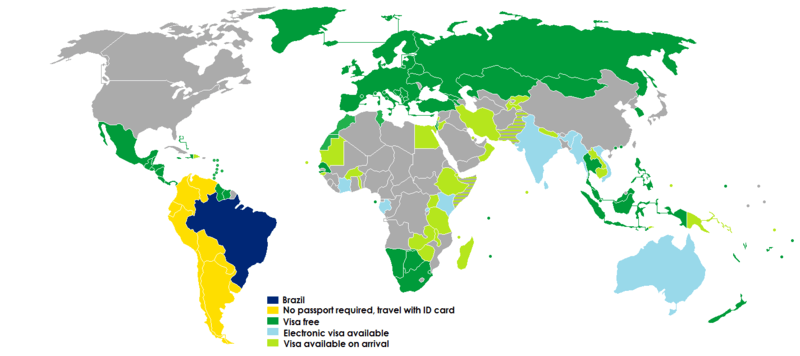Brazilian nationality law

Brazilian nationality law is based on both the principles of Jus soli and of Jus sanguinis. As a general rule, any person born in Brazil acquires Brazilian citizenship at birth, irrespective of status of parents. Nationality law is regulated by Article 12 of the Brazilian Federal Constitution.
Birth in Brazil
A person born in Brazil acquires Brazilian citizenship at birth. The only exception applies to children of persons in the service of a foreign government (such as a foreign diplomats).
Natural Brazilians born abroad
Brazilian law considers as Brazilian citizens people born abroad in two cases:
- a person born outside Brazil of a Brazilian parent who is in the service of the Brazilian government; and
- a person born outside Brazil of a Brazilian parent, provided that that person either be registered with a Brazilian consular office or later move to Brazil and confirm one's citizenship before a federal judge.
Between 1994 and 2007, registration with a Brazilian consular office did not confer Brazilian citizenship. As of September 2007, a constitutional amendment reinstituted consular registration as a means of acquiring Brazil's citizenship.
Naturalization as a Brazilian citizen
Foreigners may apply for Brazilian citizenship if they meet the following criteria: [1]
- permanent residence in Brazil
- 4 (four) years of uninterrupted residence in Brazil
- ability to speak and write Portuguese
- sufficient personal or family resources to support themselves
The residence requirement may be reduced in certain circumstances:
- only one year's residence is required for those who have a Brazilian spouse, parent, or child
- for nationals of Portuguese-speaking countries, one year's residence is required
- those with "professional, scientific, or artistic ability" may apply after two years
- persons of higher net worth may apply for Brazilian citizenship after three years
- relevant services to the country
Loss of Brazilian citizenship
Since 9 June 1994, acquisition of another country's citizenship should not cause loss of Brazilian citizenship. Those who lost Brazilian citizenship before that date may be able to apply for reinstatement.
Dual citizenship
Dual citizenship has been permitted in Brazil without restrictions since 1994. However, all Brazilian citizens must enter and leave Brazil on a Brazilian passport.
Visa free travel

Visa requirements for Brazilian citizens are administrative entry restrictions by the authorities of other states placed on citizens of Brazil. In 2016, Brazilian citizens had visa-free or visa on arrival access to 154 countries and territories, ranking the Brazilian passport 20th in the world according to the Visa Restrictions Index.
Military service
Male Brazilian citizens have a 12-month military service obligation, unless the citizen has a physical or psychological condition (though registering for the army is mandatory, the large majority of people do not serve).
See also
- Brazilian identity card
- Brazilian passport
- Cadastro de Pessoas Físicas
- History of Brazilian nationality
- Visa policy of Brazil
- Visa requirements for Brazilian citizens
References
External links
- Nationality in the Brazilian Constitution
- Estrangeiros—Ministry of Justice (Portuguese)
- Estrangeiros: Permanência—Ministry of Justice (Portuguese)
- Brazilian Consular Portal (multi-language site)
- Citizenship Laws Brazil (English)